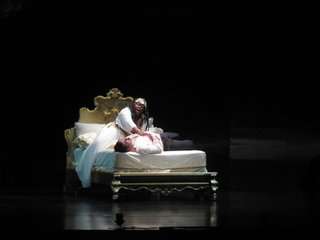|
Back
Barber’s Antony Conquers Philadelphia Philadelphia
Perelman Theater
03/17/2010 - & March 19, 21
Samuel Barber: Antony and Cleopatra
Brandon Cedel (Antony), Allison Sanders (Cleopatra), Enobarbus (Evan Boyer), Joshua Stewart (Caesar), Kevin Ray (Agrippa), Jazimina MacNeil (Charmian), J’nai Bridges (Iras), Thomas Shivone (Alexas)
The Curtis Symphony Orchestra, George Manahan (conductor)
David Zinn (scenic design), Jacob A. Climer (costume design), Lenore Doxsee (lighting design), Chas Rader-Shieber (stage director)

A. Sanders & B. Cedel (© Lenore Doxsee)
Samuel Barber’s Antony and Cleopatra disappeared from the stage after the critical drubbing it took when it opened the Metropolitan Opera’s new home at Lincoln Center in 1966. Barber’s career all but came to an end after the bitter failure of Antony and Cleopatra. The rejection affected Barber deeply although, before his death, he made some revisions to strengthen his opera. Barber has deep roots in Philadelphia – he was born in nearby Chester, Pa. and studied at the Curtis Institute of Music – but his opera has been ignored by local companies.
In collaboration with the Kimmel Center for the Performing Arts and the Opera Company of Philadelphia, the Curtis Opera Theatre finally introduced Antony and Cleopatra to Philadelphia audiences on March 17. The performance revealed the fine craftsmanship and soaring lyricism of Barber’s score. There are, to be sure, some less than inspired scenes, but the score also contains long stretches of gorgeous music. The senate scenes sound a bit perfunctory, but the solos and duets for the two title characters blossom ecstatically. Strongly cast and staged severely Curtis’ Antony and Cleopatra drew an ovation from the audience at the Perelman Theater.
Chas Rader-Shieber created a simple production set against the spare metallic set by David Zinn. Adding splashes of visual color were some flamboyant costumes by Jacob Climer. Climer put the chorus in black and grey suits but fashioned richly designed robes and gowns for Cleopatra. Oddly, the director turned Cleopatra’s attendants – Charmian (Jazimina MacNeil), Iras (J’nai Bridges) and Alexas (Thomas Shivone) – into an outlandish punk rock trio. In his spare staging, Rader-Shieber suggested the Roman senate with white chairs carried on and off stage by the chorus. A sumptuous bed provided the focal point for the imperial lovers. Despite some visual lapses, the director created powerful stage images. He capped the first act with a shower of glittering gold as Cleopatra envisioned her reunion with Antony.
Sharing the title roles are soprano Allison Sanders (Cleopatra) and Brandon Cedel (Antony). Cedel sang handsomely, especially in mid-range where his bass voice sounded rich and resonant. Higher up, his voice lost its impact. Sanders failed to project Cleopatra’s glamorous beauty, but she sang impressively. Her soprano has a wide vibrato in its middle range but gains in focus and intensity as it rises to thrilling high notes. Sanders sang generously, if with little nuance. Joshua Stewart’s suave tenor failed to generate much intensity in Caesar’s appearances, but Even Boyer (Enobarbus) sounded impressive as Antony’s friend.
George Manahan led a committed performance that caught the lyrical sweep and dramatic intensity of Barber’s music. Manahan did not clarify the complex vocal lines in the opening chorus, but he quickly took charge of the musical performance and drew superb playing from the Curtis Symphony.
Robert Baxter
|